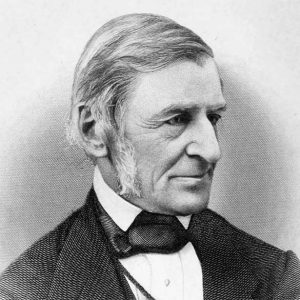Sam Torode
I believe that Emerson’s voice is needed now as much as ever, in this time of national crisis. Throughout his career, he spoke out against racial injustice and in support of American ideals. One of his continual themes is that we’re all connected—we’re all expressions of the divine soul. Not only are humans inseparable from each other, but we’re inseparable from the Earth. All must be treasured and cared for.
Others have said similar things, particularly visionary religious figures. But uniquely, Emerson holds a central position in American literature and is taught in many high school and college English courses. Moreover, Emerson opposed dogma, and his writings don’t advocate for any religion.
For the past several years, I’ve been paraphrasing Emerson’s writings into contemporary English. My first book of paraphrases, Everyday Emerson: The Wisdom of Ralph Waldo Emerson Paraphrased (American Renaissance Books 2017), covers his best-known lectures, including “The American Scholar,” “The Divinity School Address,” and “The Transcendentalist.” My hope is that this work will be used to help teach Emerson in public high schools.
My second book, Living from the Soul: The 7 Spiritual Principles of Ralph Waldo Emerson (ST Book Arts 2020), centers on Emerson’s journal entry from September 8, 1833, where he recorded a list of his core convictions. This, I believe, is a touchstone for his entire life’s work. In Living from the Soul, I augmented that journal entry with passages drawn from his sermons, essays, and lectures, to flesh out each principle.
Shortly after self-publishing Living from the Soul, I came across the work of a young cartoonist with a genius for translating philosophical ideas into comics—Alexander Marchand. I asked Alex whether he’d be willing to adapt my Emerson book, and I’m thrilled he accepted.
The result is the first ever (so far as I can tell) comic book introduction to Emerson’s life and ideas. It includes most of the text of Living from the Soul, illustrating the concepts without dumbing them down. I hope this comic will help reach younger readers—and comics lovers of all ages—with Emerson’s vital message.
Below is an except of the first principle (out of seven), “Trust Yourself.” It conveys what Emerson really meant by self-reliance—not selfishness or egotism, but following our inner moral compass.
—Sam Torode
www.amazon.com/author/samtorode
www.facebook.com/samtorodebooks
[Return to the Transparent Eyeball]
How to cite this post
Sam Torode. “An Essay about & an Excerpt from Living from the Soul.” The Transparent Eyeball, First Series, The Ralph Waldo Emerson Society, Nov. 9, 2020, emersonsociety.org/the-transparent-eyeball/an-essay-about-an-excerpt-from-living-from-the-soul/. Accessed [date of access; ex. 5 Aug. 2021].
Torode, S. (2020, Nov. 9). An Essay about & an Excerpt from Living from the Soul. The Transparent Eyeball. https://emersonsociety.org/the-transparent-eyeball/an-essay-about-an-excerpt-from-living-from-the-soul/.
Torode, Sam. “An Essay about & an Excerpt from Living from the Soul,” The Ralph Waldo Emerson Society. The Transparent Eyeball, Nov. 9, 2020, https://emersonsociety.org/the-transparent-eyeball/an-essay-about-an-excerpt-from-living-from-the-soul/.






